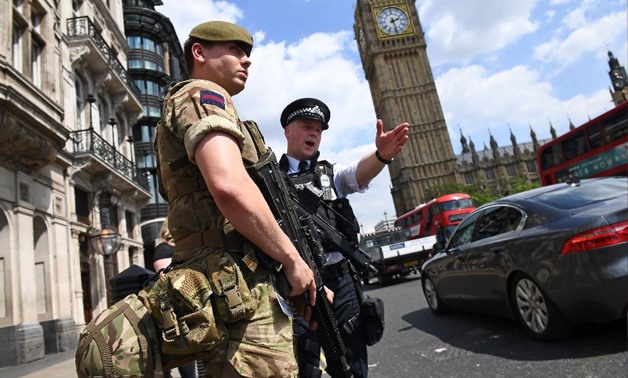
Britain's terror threat assessment has been raised to "critical", the highest level, meaning an attack is considered imminent – AFP/Justin Tallis
MANCHESTER – 28 May 2017: Britain on Saturday lowered the terror threat level which was hiked after this week's carnage in Manchester as police pushed forward with their investigation, arresting two more people.
The decision to reduce the threat level from critical to severe was announced by Prime Minister Theresa May who said there were now 11 suspects in custody over Monday night's bombing targeting young fans at a pop concert.
The latest arrests took place early on Saturday with police detaining two men, aged 20 and 22, in north Manchester.
Later in the day, police evacuated Moss Side in the south as they raided a property there, with a bomb disposal vehicle also at the scene, an AFP correspondent said.
So far, police are holding 11 suspects over Monday's blast at the end of a gig by U.S. pop idol Ariana Grande which killed 22 people, a third of them children.
Another 116 were injured in the blast which was claimed by the extremist Islamic State group.
Police in Libya also detained the father and brother of the bomber, 22-year-old Salman Abedi.
British counter-terror chief Mark Rowley said Friday police had captured "a large part of the network" linked to the bombing, confirming they were holding "some of the key players" but admitting there was still some work to do.
"Everyone's just worried, no matter where they are, it's scary stuff," Moss Side resident David Bailey, 29, told AFP after Saturday's police raids on a neighbourhood notorious for gangland violence.
Explaining the decision to reduce the terror threat level from critical -- its highest level -- to severe, May said troops would also be withdrawn from the streets, another measure adopted after the bombing.
"We should be clear about what this means: A threat level of severe means an attack is highly likely, the country should remain vigilant," she said.
Operation Temperer, which involved the deployment of troops on patrol alongside police, would also be wound down on Monday night, at the end of the bank holiday weekend.
"From midnight on Monday, there will be a well-planned and gradual withdrawal of members of the armed forces, who will return to normal duties," she said.
Greater Manchester Police said the change in threat level would not affect its investigation.
"The level of resources we have available to us remains the same as we continue to take positive action," said officer Ian Hopkin.
Armed police will be on patrol over the holiday weekend with security increased at Saturday's FA Cup final at London's Wembley Stadium, which kicks off at 1630 GMT.
And Lancashire County Cricket Club also announced extra security for a gig by the Courteeners, an indie rock group, at Old Trafford cricket ground which 50,000 people were expected to attend.
It will be the city's first major gig since the attack.
The bombing was the latest in a series of IS-claimed attacks in Europe that have coincided with a US-led offensive against the jihadist group in Syria and Iraq.
As campaigning resumed ahead of a snap June 8 election, the issue of security was brought sharply to the fore, with polls suggesting May's lead had fallen sharply.
Opposition Labour leader Jeremy Corbyn said it was the "responsibility" of governments to minimise the risk of terror by giving police the funding they need following cuts made when May was interior minister.
Between 2009-2016, the number of police officers fell by almost 20,000, or around 14 percent, the independent Institute for Fiscal Studies think tank said.
May hit back by insisting the Conservative government had "increased the funding" for security and intelligence agencies.
Authorities are currently handling 500 terror-related investigations into 3,000 individuals, with another 20,000 people on the radar of the intelligence services as posing a "residual risk".


Comments
Leave a Comment